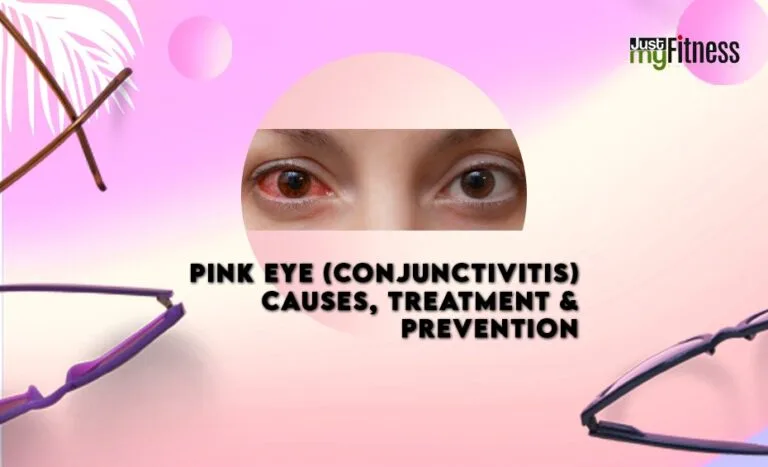Conjunctivitis also called as Pink Eye is a very infectious and common eye condition that can be activated by many issues including bacteria, viruses, allergies, or irritants. The swelling and irritation of the conjunctiva (a transparent membrane covering the inner eyelids) and the sclera (the white portion of the eye) cause a condition known as conjunctivitis or pink eye. The characteristic reddening or “pink” appearance of the eye is caused by this inflammation. In this blog post, we have explained the causes, treatments and preventions of pink eye.
Causes of Pink Eye
Three primary types of pink eye can be categorized based on its causes:
Viral Conjunctivitis
Viral conjunctivitis, usually linked to respiratory infections and resulting from viruses like adenovirus or herpes simplex virus, is highly infectious.
Bacteriological Conjunctivitis
Streptococcus and Staphylococcus are the forms of bacteria that initiates bacteriological conjunctivitis. Poor hand hygiene and contact with contaminated objects can contribute to its onset, often leading to a sticky discharge and eyelid crusting.
Allergic Conjunctivitis
Allergic conjunctivitis is a response to allergens such as pollen, dust mites, pet dander, or certain foods. It is not contagious and may coincide with other allergic symptoms like sneezing and a runny nose.
Read Also: Common Infеctious Disеasеs Ovеrviеw and Prеvеntion
Symptoms of Pink Eye
Pink eye presents a set of recognizable symptoms, including:
- Redness in the white part of the eye
- Itchiness or irritation
- Watery or mucous discharge
- Swollen eyelids
- Light sensitivity
- Blurred vision
- Crusty eyelids, particularly in cases of bacterial conjunctivitis
- Increased Tearing
- Thick Yellow discharge that crusts over your eyelashes, especially after sleeping
- Green discharge from eyes
- Itchy and swollen eye lids
- Burning Eyes

How is Pink Eye Diagnosed?
An ophthalmologist or a pediatrician will examine your eyes or your child’s eyes. Your doctor can typically identify pink eye based on your symptoms and medical background. To examine your vision, you could perform an eye chart test or acuity test.
Inform your medical professional if you have:
- Had a recent bacterial or viral infection
- Allergies
- Have you recently had anything unpleasant (such as chemicals or foreign particles) in your eyes?
- A sexually transmitted infection has been exposed to.
- Having autoimmune diseases in your family or having another cause to suspect you do.
Treatment of Pink Eye
Treatments of pink eye are mentioned below:
Seeking Medical Advice
If you suspect pink eye, consult a healthcare professional, like an optometrist or ophthalmologist, for accurate diagnosis and appropriate guidance.
Viral Conjunctivitis
Viral conjunctivitis typically resolves without intervention within one to two weeks. Management focuses on alleviating symptoms and preventing transmission:
- Apply warm compresses to the affected eye for comfort.
- Over-the-counter artificial tears can relieve dryness and irritation.
- Avoid eye rubbing to prevent virus transmission.
- Maintain hand hygiene by regular handwashing and avoiding shared items.
- In certain cases, antiviral eye drops may be prescribed by a healthcare professional.

Bacterial Conjunctivitis
Bacterial conjunctivitis necessitates antibiotic treatment to eradicate the infection:
- Prescription antibiotic eye drops or ointments are typically prescribed.
- Strict adherence to the treatment regimen is vital to prevent recurrence.
- Abstain from eye rubbing.
- Frequent handwashing and avoidance of shared objects are key to reducing contagion risk.
Allergic Conjunctivitis
Management of allergic conjunctivitis revolves around identifying and avoiding allergens:
- Recognize and minimize exposure to allergens that trigger symptoms.
- Over-the-counter antihistamine eye drops or oral antihistamines provide relief from itchiness and redness.
- Temporary relief can be found in cold compresses.
- Consult an allergist for allergy testing and personalized treatment guidance.
Preventing Pink Eye
Preventing pink eye is very importance due to its contagious nature. Implement these strategies to lower your risk of contracting or spreading the condition:
Maintain Good Hygiene
- Frequent handwashing with soap and water, especially after contact with individuals with pink eye.
- Avoid eye rubbing or touching, as it can introduce irritants or germs.
- Refrain from sharing towels, washcloths, or pillows with those who have pink eye.
Allergy Management
- If allergic conjunctivitis is the concern, identify and minimize exposure to allergens.
- Close windows during high pollen seasons.
- Utilize air purifiers and avoid environments with pet dander if you have allergies.
Contact Lens Care
- Adhere to proper contact lens hygiene, including regular cleaning and appropriate solution storage.
- Avoid wearing contact lenses while experiencing pink eye to prevent exacerbating the condition.
Public Places
- Avoid swimming in pools or hot tubs while afflicted with pink eye, as it can easily spread through water.
- Stay home from school or work until the infection clears, particularly if it is highly contagious.
Avoidance
- Individuals with allergic conjunctivitis should minimize allergen exposure by keeping windows closed and using air purifiers.
- Regularly change pillowcases and bedding to reduce allergen accumulation.
Immunizations
- Certain vaccines can safeguard against specific forms of conjunctivitis. To illustrate, you can treat mumps virus, which causes viral conjunctivitis, by using mumps, measles, and rubella (MMR) vaccines.
Conclusion
Conjunctivitis or Pink Eye is a common eye condition with various causes including viruses, bacteria, allergies or irritants. While it can be uncomfortable and contagious, it typically resolves with proper care. Seeking medical advice is essential to determine the root cause of pink eye and receive the appropriate treatment.
Promoting good hygiene practices, including handwashing and avoidance of contaminated items, is crucial for limiting the spread of pink eye. In case of uncertainty, consult a healthcare professional for personalized advice on managing and preventing pink eye.


